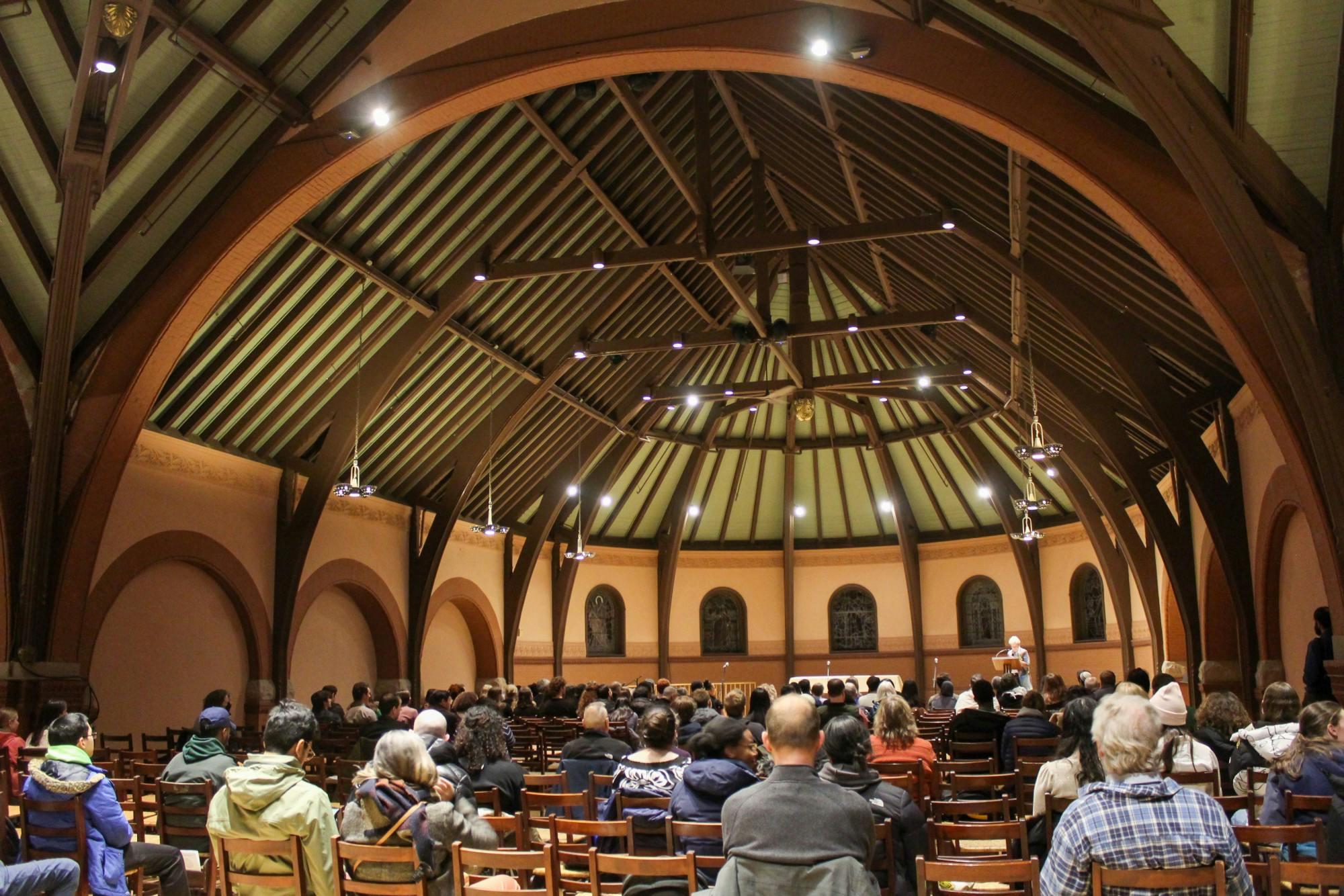Rollins Chapel reopened on Thursday with a ceremony featuring several student religious groups, musical performances and readings in the newly renovated space. The Chapel was initially closed in March 2020 due to pandemic-related policies, but it remained shut in order to allow for renovations to the building’s ventilation and heating systems.
According to College chaplain and Tucker Center for Spiritual and Ethical Living director Nancy Vogele, construction on the updated ventilation and heating systems began in June 2022 — two years after the Chapel’s initial closure — and people were not allowed to enter the chapel in the three years that the chapel was closed. The Chapel’s new features include radiant floor heating, the elimination of loud steam pipes and the installation of a hot water heating system, which is more energy efficient than the old steam heating system, she added.
“Back in the day, the steam would come on and the pipes would crank all along — we couldn’t keep worshiping right,” Vogele said. “So now it truly is quiet.”
Since its dedication in 1885, Rollins has been the spiritual center for Dartmouth. According to the Tucker Center’s website, the recent rededication celebrates the diverse environment which was created to serve all members of the College’s community.
“We certainly understand that it’s important for students, faculty, staff and related people at the campus to have quiet places for reflection, and a place that’s probably a respite from academics but still a part of the community,” Facilities Operations and Management project manager Todd Thompson, who worked on the reopening of Rollins, said.
Of particular excitement is the restoration of the Hindu Temple within Rollins Chapel, which was created in 2005, according to Hindu student organization Shanti advisor and professor Prasad Jayanti. While the Chapel was closed during the pandemic, the Hindu Temple within Rollins was moved to a room in Sudikoff Hall where worship and services were held. According to Vogele, only one or two Hindu community members were granted exemptions and allowed into the Chapel to practice puja — a daily worship ritual — before the Hindu Temple was moved to Sudikoff.
“I have been a part of Shanti from its inception, so I vividly recall the great enthusiasm with which a bunch of students, and some of us on faculty and staff … started the vision of a temple,” Jayanti said. “Dartmouth has been very kind and gracious in giving us that space. This whole journey has been fantastic and it has been so emotionally and spiritually helpful for the students.”
Now that the Chapel is open again, events and services it hosted before its closure — such as alumni weddings and memorial services — will return to the interfaith space, Vogele said. The Hopkins Center for the Arts, which is currently under construction and plans to reopen in fall 2025, will also utilize Rollins to host performances, such as musical concerts, she added.
After an organ prelude, the reopening ceremony began with a welcome address from Muslim chaplain and Tucker Center associate director Abdul Rahman Latif. For the next hour, students from Shanti and other student religious groups such as the Hillel Jewish student association, Al-Nur Muslim student association, the Zen Buddhist student group, Episcopal Campus Ministry and Morning Glory Christian Fellowship spoke at the ceremony.
“I was certainly impressed by just the diversity of students and their religious experiences and backgrounds,” Thompson said, who attended the reopening.
Anthony Fosu ’24 attended the event and spoke on behalf of Morning Glory. The reopening of Rollins has great significance to the Dartmouth community, he said.
“For me, [the reopening of Rollins] represents the chance for Dartmouth community members to do what our motto says: Be a voice crying out in the wilderness, especially in their respective traditions,” Fosu said. “I want our community to be able to use this space as much as possible, because I think that sacred spaces like this should be an integral part of everything that we do here.”
Jayanti said that in the future, he hopes that the College will provide additional resources for Hindu community members.
“I really hope that Dartmouth will appreciate the need for having a Hindu chaplain who can be there to advise students, to support students, to guide students, to channel the enthusiasm of the students to constructively learning about cultures … [and teach an] appreciation for things that are bigger than everyday common experiences that we all encounter,” he said.
Beyond his concerns for Dartmouth’s Hindu community, Jayanti said that he hopes that the inclusive nature of Rollins’s interfaith usage continues.
“[Rollins is] a place for everybody: Everyone is welcome and everyone is welcome just as they are,” Jayanti said. “You don’t have to be a Hindu and you don’t have to believe in this or that to be part of the community.”




